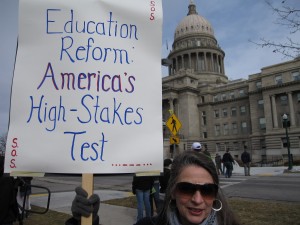It is the time of year to preserve all the good things coming out of ones garden and get rid of the weeds before they have a chance to overwinter and multiply. Out with the bad and in with the good!
Synonyms for the word “preserve” include protect, conserve, safeguard, defend, save, and the word encompasses the concept of “caring for.” The opposite is “to destroy.”
So I’m left wondering if the public has any idea what is really at stake in the American Education Reform War. Can they distinguish the good from the bad? And do people comprehend the real war versus the more public and divisive battles?
We have fought over how to teach the three R’s, what reading materials to “allow,” and the place and time for teaching religious concepts. In our communities, we fight over funding, location of schools, and sports. We have always had “turf” wars and politically motivated power struggles, but this “reform” war is different.
It is now money driving policy versus people driving policy that is the real internal war raging in our country that has made its way to the schoolhouse steps.
It has brought a new complexity to the education wars: competition in opposition to cooperation, choice against commonality, rigor versus flexibility. And the stakes are high.
What is at stake? Our way of life, our communities, our long-standing and successful public education system — it is all for sale. And there is NO indication that the buyers have any intention of preserving what we have come to grow and cherish —all that we have made good. “They” don’t care about our children.
Political power directing education policy and practices is the internal war most urgently in need of ending. Having rigid ideological agendas driving education law, or leaving renewal processes stalled, is unacceptable.
Solution: Rock Solid Federal Education Law – BRIEF (the original federal education law was 35 pages), FOC– USED on equal opportunity for disadvantaged children and communities, and BASED on effective school principles and the school improvement process.
An informed public opinion driving policy will have a very different outcome than an uninformed or misinformed public pushing the hidden agenda of those who stand to profit. So, what do people need to know in order to preserve the public system?

